Fleurs du Mal Magazine


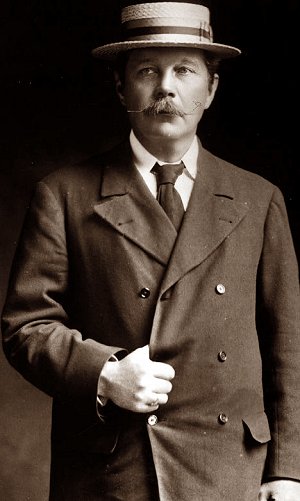
Arthur Conan Doyle
(1859-1930)
By the North Sea
Her cheek was wet with North Sea spray,
We walked where tide and shingle
meet;
The long waves rolled from far away
To purr in ripples at our feet.
And as we walked it seemed to me
That three old friends had met that
day,
The old, old sky, the old, old sea,
And love, which is as old as they.
Out seaward hung the brooding mist
We saw it rolling, fold on fold,
And marked the great Sun alchemist
Turn all its leaden edge to gold,
Look well, look well, oh lady mine,
The gray below, the gold above,
For so the grayest life may shine
All golden in the light of love.
Arthur Conan Doyle poetry
fleursdumal.nl magazine
More in: Archive C-D, Arthur Conan Doyle, Doyle, Arthur Conan
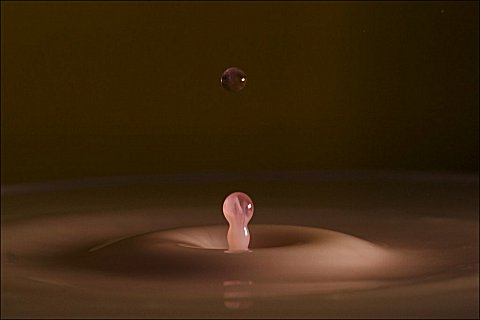
Hans Hermans photos ©2013: Splash 6
fleursdumal.nl magazine
More in: Hans Hermans Photos

Columbia University et la Bibliothèque nationale de France presente:
Festival des Ecrivains du Monde
20, 21 & 22 septembre 2013 Paris
23 & 24 septembre Lyon
Rencontrez en un seul week-end 30 écrivains de renommée mondiale : Chimamanda Ngozi Adichie, John Banville, Richard Ford, David Grossman, Ma Jian, Amin Maalouf, Petros Markaris, Catherine Millet, Michael Ondaatje, Salman Rushdie, Edmund White et beaucoup d’autres.
Friday,
September 20
19:00 – 20:00
Petros Markaris in Conversation – Language and Identity
Maison de la Poésie
Petros Markaris joins us for one night only on his way to Italy. Born in Turkey to a Greek mother and Armenian father, he became a Greek citizen in 1974. Prior to that, because of his father’s Armenian status, he had no citizenship. Join us for a special conversation with this acclaimed Greek dramaturge, screenwriter and novelist, whose Costas Haritos series of books (seven novels and one collection of short stories, to date) have won him audiences across the globe. He has translated Brecht and Goethe and is joined by novelist and Le Point editor, Christophe Ono-dit-Biot, for a conversation about language, identity and Greece’s mean streets.
Participants: Petros Markaris and Christophe Ono-dit-Biot
20:00 – 21:30
Reading Around the World
Centre Culturel Irlandais
We celebrate the inaugural Festival des Écrivains du Monde, with an international reading under the stars. Don’t miss this truly globetrotting event where you’ll be transported to Nigeria with Chimamanda Ngozi Adichie (Half of a Yellow Sun), China with Ma Jian (The Noodle Maker), Israel with that country’s most celebrated author David Grossman (To The End of the Land), Turkey with Elif Shafak (The Bastard of Istanbul), Egypt with novelist and social commentator, Ahdaf Soueif (The Map of Love), before heading to Ireland with Booker Prize winner John Banville (The Sea), and to a place completely foreign to most of us — the world of living under police protection with Salman Rushdie (Joseph Anton). Enjoy this extraordinary line-up of writers from across the globe, reading in their own languages with translations provided so you can read along.
Participants: Chimamanda Ngozi Adichie, John Banville, David Grossman, Ma Jian, Salman Rushdie, Elif Shafak, Antonio Skármeta, and Ahdaf Soueif
20:30 – 21:30
Edmund White in Conversation
Maison de la Poésie
Edmund White’s many awards and distinctions include membership in the American Academy of Arts and Letters as well as an Officier of France’s equivalent, l’Ordre des Arts et des lettres. White is an acclaimed novelist, memoirist, and essayist who writes predominantly on questions of same-sex love. From 1983 to 1990 he lived in France and was involved in the foundation of the French HIV/AIDS organization, AIDES. After returning to America, White maintained his interest in France and French literature, publishing Genet: a biography; Our Paris: sketches from memory; Marcel Proust; The Flaneur: a stroll through the paradoxes of Paris; and Rimbaud. Join him for a discussion with the head of Columbia University’s French department, Elisabeth Ladenson, about the influence of France on his literature and life.
Participants: Edmund White and Elisabeth Ladenson
22:00 – 23:30
The Translation Slam
Maison de la Poésie
his fun interactive event began in Montreal, made its way to NY where it is a Festival favorite at the PEN World Voices Festival, and now arrives to delight audiences in Paris. The Translation Slam delves into the change that happens when one text is translated into another language. The battle plays out in an onstage Slam, wherein writers read from their work in its original language, followed by a translator who will choose French words to replace the original text. By the end of the night, you’ll have first-hand experience of how easy it is for words to get lost in translation and have an all-new appreciation for the unsung heroes of literature – the translators!
Participants: Sandro Veronesi, Lila Azam Zanganeh, Dany Laferrière, Xavier Combe and six extraordinary translators
Saturday,
September 21
11:00 – 12:30
A Coffee with Catherine Millet Garden at the Musée Eugène Delacroix
Join us in the tranquil garden at the Musée Eugène Delacroix for conversation and coffee with Catherine Millet, author and founder of the esteemed magazine Art Press. Along with Dominique de Font-Réaulx, Director of the Museum, Catherine Millet will explore the crossovers and parallels between visual arts and literature. This morning’s conversation draws inspiration from the Museum’s current exhibition – Delacroix the Writer – a fascinating exploration of the literary works of one of the 19th century’s great visual artists, Eugène Delacroix. Did we mention there’ll be pastries to go with your coffee?
Participants: Catherine Millet and Dominique de Font-Réaulx
12:00 – 13:00
John Banville in Conversation – When Prose meets Poetry
Maison de la Poésie
“Book for book, there simply isn’t a better novelist writing today than John Banville. If that makes him “the best,” then I can live with it.” Richard Ford
John Banville the author of some 20 books penned in his own name but also writes internationally acclaimed noir fiction under the pseudonym, Benjamin Black. He’s an often-mentioned contender for the Nobel Prize in Literature and has been quoted as saying his goal is to give his prose “the kind of denseness and thickness that poetry has,” and that he is “trying to blend poetry and fiction into some new form.” Could there be a better setting than The House of Poetry for this special conversation with a master of English and the Adjunct Director of programming at France Culture?
Participants: John Banville and Sandrine Treiner
12:30 – 13:30
David Grossman in Conversation – The Language of Grief
Théâtre des Abbesses
David Grossman was born in Jerusalem in 1954. He is a grand figure of Israeli literature whose work is known and respected the world over. He writes novels, essays, children’s books, and non-fiction. Among them, The Book of Intimate Grammar, The Zig-Zag Kid, and See Under: Love. In 2006, he held a press conference with fellow writers Amos Oz and A.B. Yehoshua urging the Israeli government to implement a ceasefire with Lebanon. His book, To the End of Land was written partly after the death of his youngest son, Uri, during the war in Lebanon. This deeply moving novel was awarded the prestigious Prix Médicis Étranger in 2011. Since then he has written a number of poems about the impossibility of mourning a child. He says, “I feel poetry is more the language of grief than prose.” Don’t miss this conversation with a grand figure of literature and humanity with Le Monde’s Emilie Grangerary.
Participants: David Grossman and Emilie Grangerary
13:00 – 14:00
Nadeem Aslam in Conversation – Love and Conflict
Le Monde – Auditorium
Nadeem Aslam was born in 1966 in Gujranwala, a Punjabi town north of Lahore and published his first story at the age of 13 in a local newspaper in his native language of Urdu. In 1980, his family went into exile and eventually settled in West Yorkshire. Aslam learned to speak and write in English by copying out entire novels by hand. Since then, he’s written four highly praised novels. In an essay for Granta’s 2010 edition on Pakistan, Aslam wrote that literature is a “powerful instrument against injustice.” About his latest novel, The Blind Man’s Garden, Leyla Sanai wrote in The Independent on Sunday: “Once or twice a year, a book stuns me. The Blind Man’s Garden has done just that.” She notes that the book is dense with rich imagery, sage reflections, and immaculate prose. The Independent called it, “A monumental novel of love and conflict,” and declared it “breathtaking.” Today Pulitzer Prize winning journalist and Dean of Columbia University’s school of Journalism, Steve Coll, joins him for a discussion about literature and war.
Participants: Nadeem Aslam and Steve Coll
13:30 – 14:30
Amin Maalouf in Conversation – Identity and Conflict
Bibliothèque nationale de France – Grand Auditorium
Amin Maalouf was born in Beirut but left there in 1976 after the outbreak of civil war. Since then, he has lived in France and writes in French, despite it being his second language. His many award-winning works, including The Rock of Tanios, The Gardens of Light, Balthasar’s Odyssey, and most recently Origins, his most autobiographical book to date, deal with questions of identity and the experiences of civil war. Characters are often caught between languages, religions and countries. Crusades through Arab Eyes is his best known work of non-fiction. He is also a respected opera librettist. Today he’s in conversation with France Culture’s Director, Olivier Poivre d’Avor about war, identity, language, and what it means to be a novelist who writes operas.
Participants: Amin Maalouf and Olivier Poivre d’Avor
14:00 – 15:00
Deborah Eisenberg in Conversation: Short Form Fiction
Maison de la Poésie
Deborah Eisenberg didn’t start writing until she was in her thirties and even then was a reluctant starter. Yet she has been awarded the PEN/Faulkner Award for Fiction, and is a member of the Academy of Arts and Letters, among other distinctions. Reviewing her collection of short stories, Twilight of the Superheroes, The New York Times Book Review named Eisenberg , “one of the most important fiction writers now at work.”
A playwright and actress, Eisenberg will be joining us in Paris hot off the boards of her acclaimed performance in Wallace Shawn’s The Designated Mourner, in which she starred alongside Shawn. She writes for The New York Review of Books and The New Yorker, among other leading periodicals, and today joins us for a conversation about short-form fiction with Transfuge editor Oriane Jeancourt.
Participants: Deborah Eisenberg and Oriane Jeancourt
14:00 – 15:00
Walter Mosley in Conversation – The Mean Streets
Théâtre des Abbesses
Walter Mosley is a writer who is hard to characterize. He writes hugely popular and compelling crime novels, for which he is perhaps best known, but that’s by no means the extent of his talent. He also writes essays, science fiction, screenplays for films and scripts for television. Since he began writing at the age of 34, he has published at least a book a year – oftentimes two – and writes every single day without exception. His most popular protagonist of his crime novels, Easy Rawlins, is an unforgettable character steeped in the violent atmosphere of segregated Los Angeles in the 50s and 60s. Mosley’s works have been translated into 21 languages and he has some heavy-hitting fans. In 1992, then-presidential candidate Bill Clinton named Mosley as one of his favorite writers. And who are Walter Mosley’s literary heroes? He’ll discuss this and much more with sociologist, anthropologist and co-director of Communications, Nicole Lapierre.
Participants: Walter Mosley and Nicole Lapierre
14:30 – 15:30
Elif Shafak in Conversation – Reimagining East and West
Le Monde – Auditorium
Elif Shafak is a Chevalier des Arts et Lettres and is the bestselling author of a dozen books. She writes in both Turkish and in English and, in 2010, gave a TED talk – watched by more than 600,000 people on the Internet – about the role of literature in helping break down social, cultural and political barriers. Istanbul is central to many of her works and she says that it is there that, “you understand, perhaps not intellectually but intuitively, that East and West are ultimately imaginary ideas, ones that can be de-imagined and re-imagined.” Today she is joined by Susie Nicklin, Chair of The Marsh Agency Ltd., formerly Director of Literature at the British Council and Director of English PEN, for a wide-ranging discussion.
Participants: Elif Shafak and Susie Nicklin
15:30 – 17:00
The Graphic Novel
Maison de la Poésie
A writer once quipped that the only difference between a graphic novel and a comic book is “the binding.” Others argue there’s a lot more to it than that. For now, we’ll settle with the term graphic novel and ask the opinion of their creators and publishers as to the exact distinction. Antonin Baudy, working under the pseudonym Abel Lanzac, chose the graphic novel form to write about his experience working at the French Ministry of Foreign Affairs, in Quai d’Orsay. Born in Alexandria, Nadja is the author of several graphic novels: The Man of My Dreams and Les Filles de Montparnasse. Join Antonin Baudry, Nadja, and Florence Noiville of Le Monde for a fascinating look at one of the fastest growing genres in book publishing today and a discussion about why the form can stretch itself in so many different directions.
Participants: Antonin Baudry, Nadja, and Florence Noiville
15:30 – 16:30
Michael Ondaatje in Conversation – Poetry in Fiction
Bibliothèque nationale de France – Grand Auditorium
Michael Ondaatje was born in Sri Lanka and now lives in Canada. He first shot to international literary stardom with his award-winning novel, The English Patient, which was adapted to the film of the same name starring Kristin Scott Thomas, Ralph Fiennes, Juliette Binoche, and Willem Dafoe. The language of his novels bear the hallmarks of a poet and a master of language and include In the Skin of the Lion and Coming Through Slaughter, Anil’s Ghost and, most recently, The Cat’s Table. A novelist of the highest order, he is also a poet and essayist and today he’ll be in conversation about his work with Raphaël Bourgois, editor-in-chief of France Culture’s, La Grande Table.
Participants: Michael Ondaatje and Raphaël Bourgois
16:00 – 17:00
Globalization and Literature
Théâtre des Abbesses
It was initially predicted that globalization would have a particularly positive impact on literature for writers in smaller nations writing in less popular languages. Publishers and writers alike hoped that globalization might break down barriers of borders and language, opening up new markets in the process. Has that really happened? Or has globalization had a negative impact on writers and their ability to have their work published in new countries and translated into other languages? Our distinguished panel discuss the various impacts of globalization on their work – good and bad; expected and unexpected with Gayatri Chakravorty Spivak, Professor in the Humanities at Columbia University.
Participants: Vassalis Alexakis, Nadeem Aslam, Amin Maalouf, and Gayatri Chakravorty Spivak
16:30 – 17:30
Ahdaf Soueif – The Writer as Activist
Le Monde – Auditorium
Ahdaf Soueif is an Egyptian author, activist and social commentator who writes in English, although her Arabic readers say they can hear their language in her writing. Her many books include the Man Booker Prize finalist, The Map of Love. Most recently, she’s written about the first year of the Egyptian revolution in Cairo: My City, Our Revolution. Join her for an intimate presentation and back and forth with you, the audience.
Participants: Ahdaf Soueif
17:00 – 18:00
Chimamanda Ngozi Adichie and Marie Darrieussecq in conversation –
Literary Stereotypes and Identity
La Bibliothèque nationale de France – Grand Auditorium
himamanda Ngozi Adichie was born in Nigeria and moved to the United States at the age of 19. Her first novel, Purple Hibiscus, was awarded the Commonwealth Writers’ Prize in 2005 and her second novel, Half of a Yellow Sun, won the Orange Prize for Fiction after its publication in 2007. Her most recent book is a collection of short stories entitled The Thing Around Your Neck. Chimamanda is joined today by French novelist and psychoanalyst Marie Darrieussecq, whose novels include Truismes, Tom est Mort, Clèves, and most recently, Il faut beaucoup aimer les hommes, among others. Together they’ll discuss with Le Monde’s Catherine Simon, the idea of identity in literature and where the themes of their latest books overlap.
Participants: Chimanada Ngozi Adichie, Marie Darrieussecq, and Catherine Simon
18:00 – 19:00
Ishmael Beah in Conversation – Children with Guns
Maison de la Poésie
When rebels invaded Ishmael Beah’s hometown, Mogbwemo, located in the Southern Province of Sierra Leone, he was forced to flee. Separated from his family, he spent months wandering south with a group of other boys until, at the age of 13, he was forced to become a child soldier, fighting for almost three years before he was rescued by UNICEF. Beah now lives in the United States and is the author of New York Times bestselling memoir, A Long Way Gone: Memoirs of a Boy Soldier, about his experiences in the war. He is a UNICEF advocate for Children Affected by War, a member of the Human Rights Watch Children’s Advisory Committee and has spoken before the United Nations, and the Council on Foreign Relations. He’s currently working on his next book, a novel, and joins us for a wide-ranging conversation about his extraordinary life and work with Transfuge’s Damien Aubel.
Participants: Ishmael Beah and Damien Aubel
19:30 – 21:00
Adaptation
Maison de la Poésie
oin these acclaimed authors and Didier Pourquery of Le Monde for a discussion about what happens when their work is adapted to the big screen. The recently released film, No, starring Gael Garcia Bernal, was based on an unpublished play by Antonio Skármeta, which he has since released as a novel entitled, The Days of the Rainbow. Sandro Veronesi’s 2008 Prix Femina winning novel, Chaos Calme, was directed by Antonello Grimaldi for the film version of the same name, starring Nanni Moretti. Dany Laferrière’s first novel, How to Make Love to a Negro Without Getting Tired was adapted for the screen by Jacques W. Benoit, and the film, Heading South, was adapted from three of his short stories.
Participants: Antonio Skármeta, Sandro Veronesi, Dany Laferrière and Didier Pourquery
20:00 – 21:00
Richard Ford in Conversation – Canada
Auditorium du Louvre
Celebrating the French release of his new novel Canada, award-winning American novelist Richard Ford will be in conversation with Le Point’s Christophe Ono-dit-Biot for a discussion about one of Canada’s big themes – the imperceptible slide from normal to not normal, and how easily that slide can cross over to the point of no return. Richard Ford’s novel, Independence Day became the only book to be awarded both the PEN Faulkner and Pulitzer prizes. Don’t miss this fascinating conversation about borders and crossing overs – both physical and metaphysical – and the daring it takes for a writer to give away a novel’s plot in its first sentences.
Participants: Richard Ford and Christophe Ono-dit-Biot
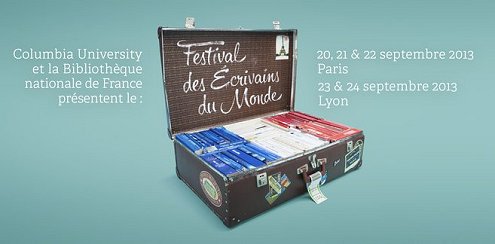
Sunday,
September 22
11:30 – 13:00
An Architectural and Literary
Walking Tour of Paris
Come on a fascinating tour of two of the central neighborhoods of Paris — the Ile de la Cité, and the Marais district. The tour will be conducted in English and led by Patrick O’Connor, Columbia’s Adjunct Assistant Professor of Architecture, Planning and Preservation. Old and new mix in a visibly fascinating way here, telling the story of the periods and peoples — from ancient Roman settlers to Résistance fighters to famous Parisian authors — who helped shape the city’s history.
This tour will be available to fifteen participants so we encourage you to book fast if you wish to attend. The meeting place for the tour will be given once your reservation is made.
13:00 – 14:00
Poetry Reading
Maison de la Poésie
Join us at the home of poetry, the Maison de la Poésie, for an afternoon of beautiful readings with four extraordinary poets. Contemporary Poets says Michael Ondaatje, “writes for the eye and the ear simultaneously.” Cécile Mainardi, joins us from her home in Nice and is the author of more than 10 collections. Her most recent book, Rose activité mortelle, was awarded the Prix de l’Académie française. Grégoire Leménager, in the Nouvel Observateur, says Dany Laferrière’s recent, The Enigma of the Return, which moves fluidly between free verse and prose, “is a magnificent book.” Winner of the Grand Prix de Poésie de l’Academie française and the Prix Goncourt for poetry, and author of some 75 collections, Jacques Réda takes us out into the streets of Paris and the world of music. Not to be missed.
Participants: Dany Laferrière, Cécile Mainardi,
Michael Ondaatje, and Jacques Réda
13:00 – 14:00
Sandro Veronesi in Conversation- XY
Reid Hall
Sandro Veronesi earned a degree in architecture before deciding to devote his life to words. He is the author of ten works of fiction including Chaos calme (Quiet Chaos) the winner of Italy’s most prestigious Strega Prize. Caos Calmo was adapted for a film of the same name, directed by Antonello Grimaldi. Like many of his other novels, the book is about family and relationships and, in this case, what happens when they are ripped apart and how lives can slowly and meticulously be put back together after tragedy. Veronesi’s non-fiction writing is on topics as diverse as soccer and rock music and he has also written a play, a screenplay and a book for children. Today, however, he talks about his most recent novel, XY, with Florence Noiville of Le Monde.
Participants: Sandro Veronesi and Florence Noiville
14:00 – 15:30
An Architectural and Literary
Walking Tour of Paris
Come on a fascinating tour of two of the central neighborhoods of Paris—the Ile de la Cité, and the Marais district. The tour will be conducted in English and led by Patrick O’Connor, Columbia’s Adjunct Assistant Professor of Architecture, Planning and Preservation. Old and new mix in a visibly fascinating way here, telling the story of the periods and peoples— from ancient Roman settlers to Résistance fighters to famous Parisian authors—who helped shape the city’s history.
This tour will be available to fifteen participants so we encourage you to book fast if you wish to attend. The meeting place for the tour will be given once your reservation is made.
14:30 – 15:30
Vassilis Alexakis in Conversation – Native Tongue
Reid Hall
Vassilis Alexakis arrived in Paris in 1968 as an exile from Greece’s military junta. Here he has stayed although he returns regularly to Greece and draws on both Greek and French culture in his many works of award-winning fiction, which include Avant, La lange maternelle, and, most recently, L’enfant grec. He is a writer deeply interested in language. He wrote his first four novels in French and then, to prove to himself that he could, wrote his fifth in Greek and then translated it into French. Since then – the early 80’s – he has written each of his books in both languages. His writing combines history and autobiography and is deeply funny and is joined today in conversation with Jean-Baptiste Harang, former literary critic of Liberation.
Participants: Vassilis Alexakis and Jean-Baptiste Harang
14:30 – 16:00
Exile
Maison de la Poésie
Our four guests have very different styles. Some write fiction, others write non-fiction. Two of our guests have penned autobiographies of very different natures. However, there is one thing that unites them all. Each knows what it is like to be the outsider, to be exiled. Lila Azam Zanganeh – born in France to exiled Iranian parents – has written a a book about Nabokov – himself an exile – that combines fiction and non-fiction. Ishmael Beah left Sierra Leone after serving as a boy soldier there, while Antonio Skármeta fled from Chile during the Pinochet years. Ma Jian packed his camera, some rice coupons, a little money and Walt Whitman’s Leaves of Grass, and for three years wandered China’s hinterland before fleeing it. Journalist Kerenn Elkaim asks the question: What impact has exile had on their work as observers and documenters of the human condition?
Participants: Lila Azam Zanganeh, Ishmael Beah,
Antonio Skármeta, Ma Jian, and Kerenn Elkaim.
16:00 – 17:00
France – America
Reid Hall
The prestigious France-Ameriques Prize, was established in 1987 and is awarded to one French writer who writes about the United States and one American author who writes about France. Heading up the panel of eight distinguished jurors is author, Amin Maalouf and this year’s acclaimed winners of the Prize are Edmund White and Bertrand Van Ruymbeke. Don’t miss this year’s recipients of the France-Ameriques prize who join us for a discussion about the challenges and rewards of writing about another country.
Participants: Edmund White, Bertrand Van Ruymbeke, and Amin Maalouf
16:30 – 18:00
Fact and Fiction
Maison de la Poésie
Today Carol Gluck, Professor of History at Columbia University asks our distinguished guests whether there is anything more real than imagination? With Walter Mosley, who does a great deal of historical research for his Easy Rawlin’s crime novels, Deborah Eisenberg, whose short stories often read like they have come from life, Ma Jian who has written memoir as well as many novels and Lila Azam Zanganeh whose book, The Enchanter is a combination of fact and fiction.
Participants: Walter Mosley, Deborah Eisenberg, Ma Jian, Lila Azam Zanganeh, and Carol Gluck
18:30 – 20:00
A musical interlude with Véronique Ovaldé and Bertrand Soulier
Maison de la Poésie
Véronique Ovaldé’s La Grâce des Brigands is the story of Maria Cristina Väätonen. Leaving behind a small-minded town in the North along with her taciturn father, a bigoted mother and a jealous sister, she arrives in Santa Monica, Los Angeles at the beginning of the 1970s. Here she becomes committed to write a novel she hopes will settle a few old scores with her family and finds herself in the arms of a troubled writer, Rafael Claramunt who has fallen from grace and we don’t know if he is going to find himself as a Pygmalion or an impostor… Marvelous reader, Véronique Ovaldé is joined for this special evening by composer Bertrand Soulier who she describes as “a composer who sings, smokes, and loves quite exclusively to the end.” Nothing like the character Rafael Claramunt from the novel! This musical event was created in February 2012 for the Tandem Festival.
Participants: Véronique Ovaldé and Bertrand Soulier
20:00 – 21:00
Salman Rushdie in Conversation
Auditorium du Louvre
In 1981, Salman Rushdie’s second novel, Midnight’s Children, was awarded the Booker Prize for Fiction among other accolades. In 1993, that same novel was judged to be the ‘Booker of Bookers’, the best novel to have won the Booker Prize for Fiction in the award’s 25-year history. The novel has just been released as a film for which Rushdie was screenwriter and narrator. Rushdie’s fourth novel, The Satanic Verses, led the Iranian religious authorities to issue a fatwa against him. Despite the fatwa, the novel was also shortlisted for the Booker Prize and won the Whitbread Prize. But that edict from Iran sent the author into police protection and a life of bodyguards, death, and danger. Tonight, with Nelly Kaprièlian, literary editor of Les Inrocks, Rushdie discusses his most recent book, Joseph Anton, which describes his years in hiding. They’ll talk about how a writer can survive and continue to write when his everyday movements are monitored and controlled, and much of life is simply out of his hands.
Participants : Salman Rushdie and Nelly Kapriélian
Monday,
September 23
The Festival des Écrivains du Monde heads to Lyon
19:30
An Intimate Conversation with Richard Ford
Institution des Chartreux, Lyon
Celebrating the French release of his new book, Canada, Richard Ford will be in conversation with Josyane Savigneau, writer and journalist with Le Monde.
Canada explores the loneliness of American life from the perspective of a fifteen-year-old boy and the brutal impact of parental foolishness on his life. Richard Ford’s novel, Independence Day, received both the Pulitzer Prize and the PEN Faulkner Award for Fiction, the only book to do so. His books investigate the intimacy and complexities of daily life. Please join us for an inspired evening.
Tuesday,
September 24
Lyon 20:00
A Conversation with Amin Maalouf & Nadeem Aslam
Théâtre de la Croix-Rousse, Lyon
Join us for a special evening with Amin Maalouf and Nadeem Aslam in Lyon for a conversation with Sandrine Treiner, writer and deputy manager and programming director of France Culture about home and the consequences of leaving it behind.
Lost or found, with nostalgia or regret or longing—how do we see and speak about the country where we were born once we’ve left it behind? What is the desire to leave or to stay? How does our native country surface and show itself in writing?
Born into the Christian minority in Lebanon and settled in France since 1976, Amin Maalouf’s first book, The Crusades Through Arab Eyes, was a huge success and remains in print after more than twenty years. Winner of the Prix Goncourt for The Rock of Tanios in 1993, he is the author of many books, including Ports of Call, Origins: A Memoir, and On Identity. He has been a member of l’Académie française since 2011.
Born in Pakistan, Nadeem Aslam moved with his family to the UK as a teenager when his father, a Communist, fled President Zia’s regime. His 2004 novel, Maps for Lost Lovers, was longlisted for the Booker Prize and received numerous awards. Author of three other novels, his most recent is The Wasted Vigil. Nadeem Aslam’s work is published in more than ten countries.
≡ Website Festival des Ecrivains du Monde
fleursdumal.nl magazine for art & literature
More in: Art & Literature News, FDM in Paris

Ton van Reen
DE GEVANGENE XV
Sprookjes
Plotseling kwam het meisje binnen en zei: `Dag, Leo.’ Hij schrok. Ze ging naast hem zitten. Keek langs hem heen naar buiten. Hij zag dat haar gezicht nat was. Ze had gehuild.
Buiten konden ze de asman niet op het asvat zien zitten. Het was te donker. Ook het huis waarin het meisje woonde, konden ze niet zien. De nacht was niet voor niets een grote zwarte vent die alles kon verbergen achter zijn brede lijf.
Ze rook naar struiken en aarde. Alsof iemand haar in de grond had gedoopt. Om haar te laten bloeien als vruchtbaarheidssymbool. Ze zou uit de kuil zijn gestapt om naar Leo te komen. Om naast hem te kunnen zitten als een plant, naar aarde geurend en al, om naar buiten te staren, waar niets te zien was.
Eerst dacht hij dat het een vergissing was dat ze bij hem binnen was komen lopen. Later vertelde ze een sprookje waarnaar hij ademloos luisterde.
Het was een sprookje over Spanjaarden die van ver kwamen om haar op handen te dragen. En van een tram waarin ze door de nacht reden. Naar ver buiten de stad. Zij met haar Spanjaarden. Wat was dat toch dat ze zo vol zat van Spanjaarden? In een tram vol mensen die jaloers waren. Ze mochten niet uitstappen. Ze moesten op de houten banken blijven zitten kijken naar haar en de Spanjaarden. Op het land was ze met de Spanjaarden uitgestapt. Akelig blij was de tram vertrokken. De mensen die in de stad woonden, waren opgelucht geweest. Ze reden terug naar huis, terug naar zand en cement, beroet glas en schimmel. Zo had ze het gezegd.
Ze vertelde het sprookje van hotel Eden, waar altijd Spaanse muziek klonk. Waar de mensen fluisterden. De liefde werd er bedreven op muziek. Dat was zo fijn dat ze er altijd had willen blijven. Over geld werd nooit gepraat. Rondom hotel Eden stonden bloemen die voortdurend bloeiden.
Ze vertelde zo mooi dat het geen sprookjes meer waren. Dat Leo moest geloven dat het echt was. Toen ze ophield met vertellen, zag hij echter aan haar gezicht dat ze loog. Dat maakte indruk op hem. Graag zou hij voor haar alles waar willen maken, alleen al om de uitdrukking op haar gezicht. In de twintig jaar achter de ruit had hij geleerd wat echt verdriet was.
Hij zei haar dat ze terug moest komen wanneer de tram niet meer naar de velden reed. Wanneer de bloemen rondom hotel Eden uitgebloeid zouden zijn. Dat hij haar op zijn beurt verhalen zou vertellen die niet waar konden zijn. Hij moest ze eerst nog verzinnen. Daarom waren ze juist echt.
Ik kom terug, had ze gezegd. Ze was het huis uit gelopen. Even later had hij haar als een schim in het donker zien verdwijnen. Daarna hoorde hij hoe de asman zijn voeten verschoof, het knarsen van het asvat over de tegels.
Het zou de eerste en enige keer zijn geweest dat ze bij hem binnenkwam. Ze zou niet meer durven. Ze had gezien dat de muur achter hem kaal was. In zijn huis was zelfs niets wat op een bloem leek. Ze kon niet weten dat hij geen bloemen in zijn huis duldde omdat bloemen konden spreken. Als de bloemen in zijn huis zouden spreken, dan zouden ze hem alleen maar tegenspreken. Dat zou hij nooit kunnen verdragen. Of zo’n meisje dat zou kunnen begrijpen! Ze was ‘s nachts gekomen. Dat betekende dat ze te veel gedronken had. Normaal ging een meisje ‘s nachts niet bij iemand naar binnen. Zeker niet bij een vent die geen benen had en die Leo heette.
(wordt vervolgd)
fleursdumal.nl magazine
More in: - De gevangene

MARTIN BEVERSLUIS
T.
Twee torenspitsen tanken twaalf
tellen tegenlicht tevens treitert
toeval talent telkens tegenslagen
tenenkrommend toen totems
tempels tanend talmend toezagen
trots toestonden tof tekortschoten
tekens tegenwoordig tampeloeres
tetanus teef toverstafjes trainden
tafels tegen tranen tegenstrevers
toonden taken tuitten totnogtoe
toeten toverden tepels troon
toekenning tomaten tijd totaal
tenietgedaan toekomsten toch
toegestaan tilburg tilt tot top.
Martin Beversluis poetry
fleursdumal.nl magazine
More in: Archive A-B, Beversluis, Martin
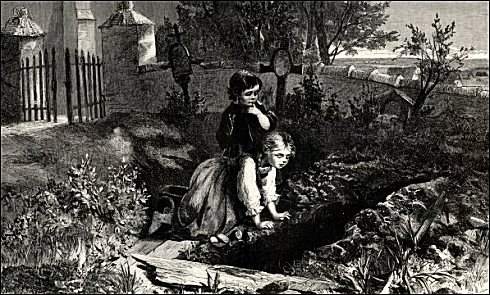
Märchen der Brüder Grimm
Jacob Grimm (1785-1863) & Wilhelm Grimm (1786-1859)
Der arme Junge im Grab
Es war einmal ein armer Hirtenjunge’ dem war Vater und Mutter gestorben, und er war von der Obrigkeit einem reichen Mann in das Haus gegeben, der sollte ihn ernähren und erziehen. Der Mann aber und seine Frau hatten ein böses Herz, waren bei allem Reichtum geizig und mißgünstig, und ärgerten sich, wenn jemand einen Bissen von ihrem Brot in den Mund steckte. Der arme Junge mochte tun, was er wollte, er erhielt wenig zu essen, aber desto mehr Schläge.
Eines Tages sollte er die Glucke mit ihren Küchlein hüten. Sie verlief sich aber mit ihren Jungen durch einen Heckenzaun: gleich schoß der Habicht herab und entführte sie durch die Lüfte. Der Junge schrie aus Leibeskräften ‘Dieb, Dieb, Spitzbub.’ Aber was half das? der Habicht brachte seinen Raub nicht wieder zurück. Der Mann hörte den Lärm, lief herbei, und als er vernahm, daß seine Henne weg war, so geriet er in Wut und gab dem Jungen eine solche Tracht Schläge, daß er sich ein paar Tage lang nicht regen konnte. Nun mußte er die Küchlein ohne die Henne hüten, aber da war die Not noch größer, das eine lief dahin, das andere dorthin. Da meinte er es klug zu machen, wenn er sie alle zusammen an eine Schnur bände, weil ihm dann der Habicht keins wegstehlen könnte. Aber weit gefehlt. Nach ein paar Tagen, als er von dem Herumlaufen und vom Hunger ermüdet einschlief, kam der Raubvogel und packte eins von den Küchlein, und da die andern daran festhingen, so trug er sie alle mit fort, setzte sich auf einen Baum und schluckte sie hinunter. Der Bauer kam eben nach Haus, und als er das Unglück sah, erboste er sich und schlug den Jungen so unbarmherzig, daß er mehrere Tage im Bette liegen mußte.
Als er wieder auf den Beinen war, sprach der Bauer zu ihm ‘du bist mir zu dumm, ich kann dich zum Hüter nicht brauchen, du sollst als Bote gehen.’ Da schickte er ihn zum Richter, dem er einen Korb voll Trauben bringen sollte, und gab ihm noch einen Brief mit. Unterwegs plagte Hunger und Durst den armen Jungen so heftig, daß er zwei von den Trauben aß. Er brachte dem Richter den Korb, als dieser aber den Brief gelesen und die Trauben gezählt hatte, so sagte er ‘es fehlen zwei Stück.’ Der Junge gestand ganz ehrlich, daß er, von Hunger und Durst getrieben, die fehlenden verzehrt habe. Der Richter schrieb einen Brief an den Bauer und verlangte noch einmal soviel Trauben. Auch diese mußte der Junge mit einem Brief hintragen. Als ihn wieder so gewaltig hungerte und durstete, so konnte er sich nicht anders helfen, er verzehrte abermals zwei Trauben. Doch nahm er vorher den Brief aus dem Korb, legte ihn unter einen Stein und setzte sich darauf, damit der Brief nicht zusehen und ihn verraten könnte. Der Richter aber stellte ihn doch der fehlenden Stücke wegen zur Rede. ‘Ach,’ sagte der Junge, ‘wie habt Ihr das erfahren? der Brief konnte es nicht wissen, denn ich hatte ihn zuvor unter einen Stein gelegt.’ Der Richter mußte über die Einfalt lachen, und schickte dem Mann einen Brief, worin er ihn ermahnte, den armen Jungen besser zu halten und es ihm an Speis und Trank nicht fehlen zu lassen; auch möchte er ihn lehren, was recht und unrecht sei.
‘Ich will dir den Unterschied schon zeigen,’ sagte der harte Mann; ‘willst du aber essen’ so mußt du auch arbeiten, und tust du etwas Unrechtes, so sollst du durch Schläge hinlänglich belehrt werden.’ Am folgenden Tag stellte er ihn an eine schwere Arbeit. Er sollte ein paar Bund Stroh zum Futter für die Pferde schneiden; dabei drohte der Mann: ‘in fünf Stunden,’ sprach er, ‘bin ich wieder zurück, wenn dann das Stroh nicht zu Häcksel geschnitten ist, so schlage ich dich so lange, bis du kein Glied mehr regen kannst.’ Der Bauer ging mit seiner Frau, dem Knecht und der Magd auf den Jahrmarkt und ließ dem Jungen nichts zurück als ein kleines Stück Brot. Der Junge stellte sich an den Strohstuhl und fing an, aus allen Leibeskräften zu arbeiten. Da ihm dabei heiß ward, so zog er sein Röcklein aus und warfs auf das Stroh. In der Angst, nicht fertig zu werden, schnitt er immerzu, und in seinem Eifer zerschnitt er unvermerkt mit dem Stroh auch sein Röcklein. Zu spät ward er das Unglück gewahr, das sich nicht wieder gutmachen ließ. ‘Ach,’ rief er, ‘jetzt ist es aus mit mir. Der böse Mann hat mir nicht umsonst gedroht, kommt er zurück und sieht, was ich getan habe, so schlägt er mich tot. Lieber will ich mir selbst das Leben nehmen.’
Der Junge hatte einmal gehört, wie die Bäuerin sprach ‘unter dem Bett habe ich einen Topf mit Gift stehen.’ Sie hatte es aber nur gesagt, um die Näscher zurückzuhalten, denn es war Honig darin. Der Junge kroch unter das Bett, holte den Topf hervor und aß ihn ganz aus. ‘Ich weiß nicht,’ sprach er, ‘die Leute sagen’ der Tod sei bitter, mir schmeckt er süß. Kein Wunder, daß die Bäuerin sich so oft den Tod wünscht.’ Er setzte sich auf ein Stühlchen und war gefaßt zu sterben. Aber statt daß er schwächer werden sollte, fühlte er sich von der nahrhaften Speise gestärkt. ‘Es muß kein Gift gewesen sein,’ sagte er, ‘aber der Bauer hat einmal gesagt’ in seinem Kleiderkasten läge ein Fläschchen mit Fliegengift, das wird wohl das wahre Gift sein und mir den Tod bringen.’ Es war aber kein Fliegengift’ sondern Ungarwein. Der Junge holte die Flasche heraus und trank sie aus. ‘Auch dieser Tod schmeckt süß,’ sagte er, doch als bald hernach der Wein anfing ihm ins Gehirn zu steigen und ihn zu betäuben, so meinte er, sein Ende nahte sich heran. ‘Ich fühle, daß ich sterben muß,’ sprach er, ‘ich will hinaus auf den Kirchhof gehen und ein Grab suchen.’ Er taumelte fort, erreichte den Kirchhof und legte sich in ein frisch geöffnetes Grab. Die Sinne verschwanden ihm immer mehr. In der Nähe stand ein Wirtshaus, wo eine Hochzeit gefeiert wurde: als er die Musik hörte, deuchte er sich schon im Paradies zu sein, bis er endlich alle Besinnung verlor. Der arme Junge erwachte nicht wieder, die Glut des heißen Weines und der kalte Tau der Nacht nahmen ihm das Leben, und er verblieb in dem Grab, in das er sich selbst gelegt hatte.
Als der Bauer die Nachricht von dem Tod des Jungen erhielt, erschrak er und fürchtete, vor das Gericht geführt zu werden: ja die Angst faßte ihn so gewaltig, daß er ohnmächtig zur Erde sank. Die Frau, die mit einer Pfanne voll Schmalz am Herde stand, lief herzu, um ihm Beistand zu leisten. Aber das Feuer schlug in die Pfanne, ergriff das ganze Haus, und nach wenigen Stunden lag es schon in Asche. Die Jahre, die sie noch zu leben hatten, brachten sie, von Gewissensbissen geplagt, in Armut und Elend zu.
ENDE
Die Märchen der Brüder Grimm
fleursdumal.nl magazine
More in: Grimm, Grimm, Andersen e.o.: Fables, Fairy Tales & Stories, Grimm, Jacob & Wilhelm
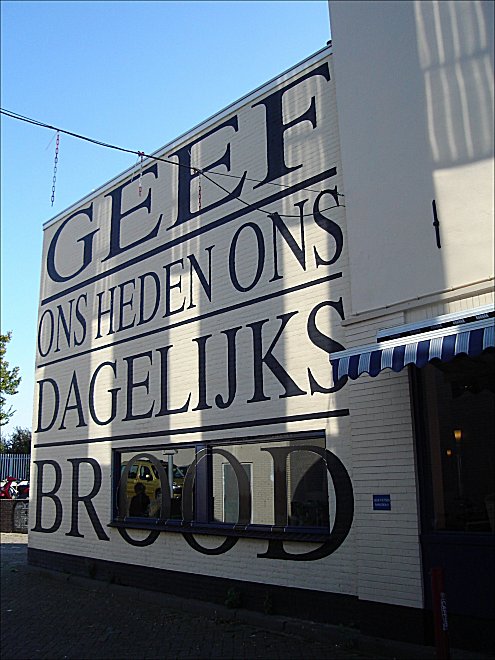
Street Poetry: Geef ons heden ons dagelijks brood (Vlissingen)
fleursdumal.nl magazine
photo jef van kempen
More in: Street Art
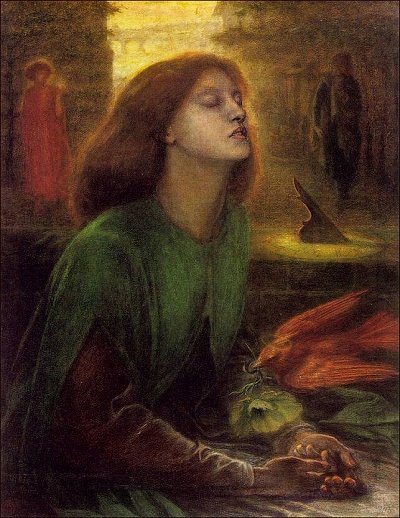
Elizabeth (Lizzie) Siddal
(1829-1862)
The Lust of the Eyes
I care not for my Lady’s soul
Though I worship before her smile;
I care not where be my Lady’s goal
When her beauty shall lose its wile.
Low sit I down at my Lady’s feet
Gazing through her wild eyes
Smiling to think how my love will fleet
When their starlike beauty dies.
I care not if my Lady pray
To our Father which is in Heaven
But for joy my heart’s quick pulses play
For to me her love is given.
Then who shall close my Lady’s eyes
And who shall fold her hands?
Will any hearken if she cries
Up to the unknown lands?
Elizabeth (Lizzie) Siddal poems
fleursdumal.nl magazine for art & literature
More in: Archive S-T, Lizzy Siddal, Siddal, Lizzy
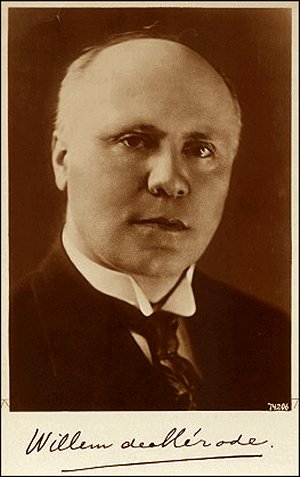
Willem de Mérode
(1887-1939)
De Dichter
Er leven velen in hem, maar zij sluimren.
Hij mag hen niet ontwekken, en hij wacht
Of geen zich wakker woelen zal, en zacht,
Een duif, tot ’t leven kringlen zal en tuimlen.
Als hij hun schaduw in de grijze nacht
Bewegen ziet, en waagt in de gezichten
Een licht te wekken en met hen te richten,
Bespeurt hij dat hun masker hem veracht.
Zij moeten zelf uit zware slaap zich breken,
Dan zullen zij door zijne lippen spreken
Met woorden ademwarm van liefde en nood.
Hij was zeer moedeloos en zeide bitter:
Bleek wordt hun slaap en ’t leven maakt mij witter.
En toen ontwaakte een in hem en werd groot.
fleursdumal.nl magazine
More in: Archive M-N, Mérode, Willem de
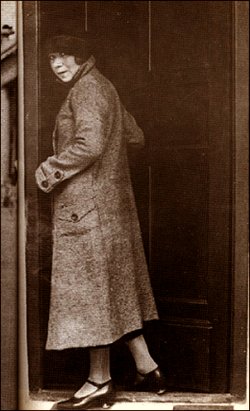
Alfonsina Storni
(1892-1938)
Voy a Dormir
Dientes de flores, cofia de rocío,
manos de hierbas, tú, nodriza fina,
tenme prestas las sábanas terrosas
y el edredón de musgos escardados.
Voy a dormir, nodriza mía, acuéstame.
Ponme una lámpara a la cabecera;
una constelación; la que te guste;
todas son buenas; bájala un poquito.
Déjame sola: oyes romper los brotes…
te acuna un pie celeste desde arriba
y un pájaro te traza unos compases
para que olvides… Gracias. Ah, un encargo:
si él llama nuevamente por teléfono
le dices que no insista, que he salido…
Alfonsina Storni poetry
fleursdumal.nl magazine
More in: Archive S-T, Storni, Alfonsina

Ton van Reen
DE GEVANGENE XIV
Meneer Pesche had restaurant Varsgarten geërfd van zijn vader. Als kind had hij in de tuin gespeeld met het kind van de toenmalige gerant. Landveroveren bijvoorbeeld hadden ze gespeeld. Met een groot mes sneed meneer Pesche, die toen nog geen meneer Pesche was, altijd te veel van het land af van de zoon van de gerant, de latere gerant. Als de latere gerant kwaad werd en zei dat meneer Pesche te veel van zijn land nam, sneed meneer Pesche nog meer af van het land van de latere gerant.
De latere gerant speelde vaak slingeraap. Meneer Pesche durfde nooit. Hij was bang dat hij in de beek zou vallen. Zwemmen kon hij niet. Hij had het nooit kunnen leren. Hij had handjes waarmee hij in het water geen weg wist. Zijn handen waren nog steeds zo klein. Als hij iets wilde pakken, moest hij dat met zijn armen doen.
Samen bouwden ze speelgoedhuizen, de latere gerant en de latere meneer Pesche. Omdat die van slap papier waren, vielen ze al in elkaar als iemand het waagde te zuchten. Dan gooiden ze alle speelgoed en alle ingevallen huizen op een hoop en staken er de brand in. Later hadden ze nooit een huis beter zien branden dan de huizen die ze zelf bouwden uit papier en aan elkaar lijmden met een half gekookte aardappel, en die in elkaar vielen als ze alleen maar zuchtten. De plakaardappels gooiden ze in de as. Ze begonnen te stinken en veroorzaakten een lucht zoals die in oerwouden hing. Apen en andere dieren waren er dol van geworden, hadden zwammen gekregen in hun hersens, zodat ze wat verstand aanging bij de mensen achterbleven.
Als ze slingeraap speelden, de aankomende gerant in de boom en de aankomende meneer Pesche onder de boom, stond de vader van meneer Pesche er hoofdschuddend naar te kijken. Hij was bang dat zijn zoon acrobaat wilde worden. Dat hij daarvoor oefende door slingeraap te spelen. De wens van de vader was dat de zoon het deftige en goed beklante restaurant Varsgarten, dat hij met eigen handen had opgebouwd uit de opbrengst van soepen en schotels, zou overnemen. Om de scepter te zwaaien over kokende en pruttelende potjes en pannetjes en schoteltjes met voer.
Voor zichzelf had de vader al een vleugel gereserveerd met een piano. Hij wilde nog aan kunst doen voordat hij dood zou gaan. Om niet voor niets geleefd te hebben. Hij besefte dat men niet alleen kon leven voor potjes en schoteltjes voer. Hij had er zich meermalen op betrapt dat hij noten schreef op een vel papier, dat hij die noten probeerde te neuriën. Later schreef hij er een bestelling voor eten overheen. Van de noten zag hij nooit meer wat. En aan voer had hij zijn handen vol.
Was het een wonder dat de jonge meneer Pesche kaartenhuizen bouwde en huizen van papier? Hij wilde het goed beklante restaurant Varsgarten niet overnemen, noch het nieuwe en nog niet beklante hotel Eden, dat vanaf de eerste dag van zijn bestaan de kwade naam had dat men er meisjes mocht uitkleden voor geld. Hij had de brand willen steken in restaurant Varsgarten. Hij had voorgesteld het te verkopen toen hij oud genoeg was om het te erven. Maar zijn vader wilde er koste wat het kost pianospelen. Toen hij toch de zaak had overgenomen, was het hele huis verdrietig geworden. De klanten gingen lopen. Aten liever in hotel Eden, waar ze als aperitief een mooie meid konden krijgen. Zijn vader was gestorven. Zelf was hij verhuisd naar de Libertystraat. Alleen de gerant was gebleven. Meneer Pesche bleef hem salaris betalen. Daar had hij vrede mee.
Meneer Pesche was er blijven eten. Hij dacht dat het goed was soms te kunnen praten van: zeg, weet je nog van toen en toen? Van dat slingeraap spelen? Denk je nog wel eens aan de plakaardappels die we in het vuur gooiden als we de papieren huizen verbrandden?
(wordt vervolgd)
fleursdumal.nl magazine
More in: - De gevangene
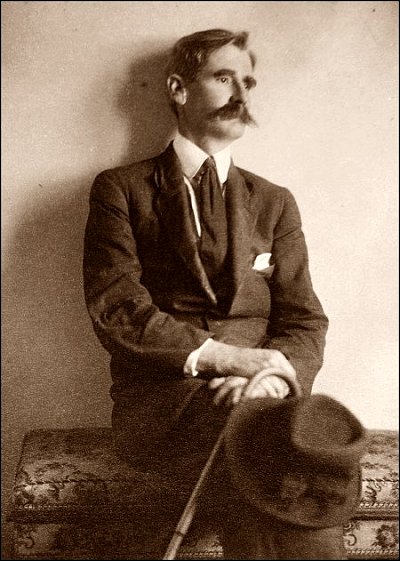
Henry Lawson
(1867-1922)
Knocked Up
I’m lyin’ on the barren ground that’s baked and cracked with drought,
And dunno if my legs or back or heart is most wore out;
I’ve got no spirits left to rise and smooth me achin’ brow —
I’m too knocked up to light a fire and bile the billy now.
Oh it’s trampin’, trampin’, tra-a-mpin’, in flies an’ dust an’ heat,
Or it’s trampin’ trampin’ tra-a-a-mpin’
through mud and slush ‘n sleet;
It’s tramp an’ tramp for tucker — one everlastin’ strife,
An’ wearin’ out yer boots an’ heart in the wastin’ of yer life.
They whine o’ lost an’ wasted lives in idleness and crime —
I’ve wasted mine for twenty years, and grafted all the time
And never drunk the stuff I earned, nor gambled when I shore —
But somehow when yer on the track yer life seems wasted more.
A long dry stretch of thirty miles I’ve tramped this broilin’ day,
All for the off-chance of a job a hundred miles away;
There’s twenty hungry beggars wild for any job this year,
An’ fifty might be at the shed while I am lyin’ here.
The sinews in my legs seem drawn, red-hot — ‘n that’s the truth;
I seem to weigh a ton, and ache like one tremendous tooth;
I’m stung between my shoulder-blades — my blessed back seems broke;
I’m too knocked out to eat a bite — I’m too knocked up to smoke.
The blessed rain is comin’ too — there’s oceans in the sky,
An’ I suppose I must get up and rig the blessed fly;
The heat is bad, the water’s bad, the flies a crimson curse,
The grub is bad, mosquitoes damned — but rheumatism’s worse.
I wonder why poor blokes like me will stick so fast ter breath,
Though Shakespeare says it is the fear of somethin’ after death;
But though Eternity be cursed with God’s almighty curse —
What ever that same somethin’ is I swear it can’t be worse.
For it’s trampin’, trampin’, tra-a-mpin’ thro’ hell across the plain,
And it’s trampin’ trampin’ tra-a-mpin’ thro’ slush ‘n mud ‘n rain —
A livin’ worse than any dog — without a home ‘n wife,
A-wearin’ out yer heart ‘n soul in the wastin’ of yer life.
Henry Lawson poetry
fleursdumal.nl magazine
More in: Archive K-L, Lawson, Henry
Thank you for reading Fleurs du Mal - magazine for art & literature